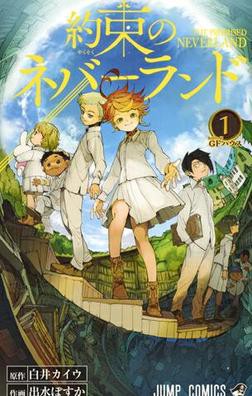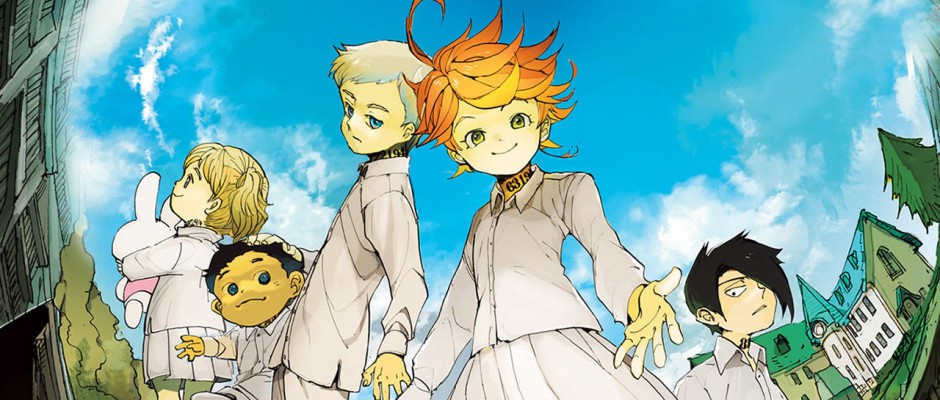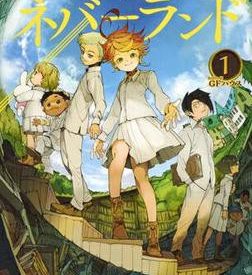 Cover of the first tank?bon volume of The Promised Neverland, as published by Shueisha on December 2, 2016
Cover of the first tank?bon volume of The Promised Neverland, as published by Shueisha on December 2, 2016
Season 1 air date: January 1st ? March 28th, 2019Season 2 announced for 2020
Synopsis (from VIZ)
Emma, Norman and Ray are the brightest kids at the Grace Field House orphanage. And under the care of the woman they refer to as ?Mom,? all the kids have enjoyed a comfortable life. Good food, clean clothes and the perfect environment to learn ? what more could an orphan ask for? One day, though, Emma and Norman uncover the dark truth of the outside world they are forbidden from seeing.
Perhaps one of the best animes of winter 2019, Yakusoku No Neverland offers an endearing set of characters against the backdrop of dark fantasy and thriller, a fast-paced journey difficult not to become invested in. Episode 1 hits the ground running, with an opening scene of the three protagonists ? bright with gravity-defying hair Emma, calm and sweet Norman, and the broody yet brilliant tactician Ray ? at the edge of a forest, peering behind bars into a world they can only dream of?in their nightmares.
Storyline
What ensues after the unintentional discovery of the truth is a quest of survival. What intrigued me most is the first 20 minutes of the first episode setting a bright and cheery stage, going through the daily life at the orphanage and the happy lives the children lead. The music and love shown by Mama, the woman who runs the house, belies the nightmare they live in.
Initially, I thought it to be an anime for a younger crowd, given the ages of the children (the trio are just under 12 years old) and the story initially being presented. But midway, the vibrancy suddenly shifts to a darker sort of urgency, one that strings together the rest of the story into a fast-paced, action-packed game of cat-and-mouse between the children and their enemies. Each character struggles with heartbreak, having been raised comfortably to believe they would be adopted some day, grappling with a truth no one could have possibly guessed. Their subsequent moves forward each reveal the philosophical underpinnings of what is essentially a war ? does one try to save as many people as possible despite little chance of success? Or ensure the safety of a few if success is guaranteed? Can life be bartered with? Can life be used as a bargaining tool? Can good people be pushed to evil?
Every episode ends in the middle of a high tense situation, and the next begins exactly where the last left off, but often by revealing a previously unknown context to the viewer. Yakusoku attempts many plot twists, some well executed and others quite standard. What makes a plot twist a twist is when just enough clues are woven throughout the episodes so that later resolutions are no deus ex machina, and just enough is withheld that the viewer is deftly pushed to edge of their seat, left anxiously to fill in the gaps. Yakusoku, at times, does find itself lingering in unnecessary tangents, and there are cliches ? like a secret room behind a bookcase ? despite the promise by an eerie premise. Yet it redeems itself, not through attempted misdirection and last minute revelations, but by exploring the psyche of the characters.
Characters
We see and learn about the world through the eyes of Emma, Ray, and Norman, but the primary driver of the story is Emma. Her bright eyes and optimistic temperament remain a source of hope throughout what is otherwise a sorrowful narrative. Her naivety, however, is perhaps the biggest obstacle in determining the best course of action, and often countered by Ray?s almost utilitarian outlook. Norman plays the middleman as the calm and collected one of the trio, considering all angles and empathizing with Emma?s struggles.

As the story moves forward, we?re introduced to some of the other children as well, each unique in personality and outlook, who support the main characters by bringing to light shortcomings and flaws in their plans. The personalities can be archetypal ? there?s perhaps room to compare the trio?s calculating qualities to the likes of Light Yagami from Death Note or Lelouch vi Britannia from Code Geass, though neither of them quite fit. Both hunt to remold the world, whereas the trio fights a fate as the hunted.
Animation
There have been differing opinions on the animation and overall color scheme. Part of it can be attributed to the setting ? a large building meant to house some three dozen children surrounded by a forest doesn?t lend itself to the brightest of hues. The children wear standard issue white uniforms, so between that and the unyielding browns and greens of nature, it?s quite a dreary landscape.
But, I found the CGI usage fantastic and well done. The most poignant, jarring scenes were deftly done by use of avant-garde camera angles. The soundtrack is fitting, though overwhelming in charged moments, yet it?s when music was absent that really brings the genres of dark fantasy and thriller to fruition. Eerie creaks, water dripping from a faucet, and the angle positioned outside the character?s range of vision, as though someone is perpetually following them all contribute to an unsettling fear for these kids? futures.
But somewhere in there, witnessing their tenacity, provides a glimmer of hope. At the core of a strange intersection of genres and settings is the story of family, sacrifice, and ideals. If you like strategy and mind games, and a heavy dose of optimism among despair, then this might be a fitting watch for you. Yakusoku No Neverland isn?t perfect, but it gets close.
Addendum:
I started the manga and currently up to speed with the latest chapter. Season one adapts the first 37 chapters, and is almost entirely faithful to source material. The manga, maybe because of artistic style, is more explicit in the illustration of the world?s brutality.


